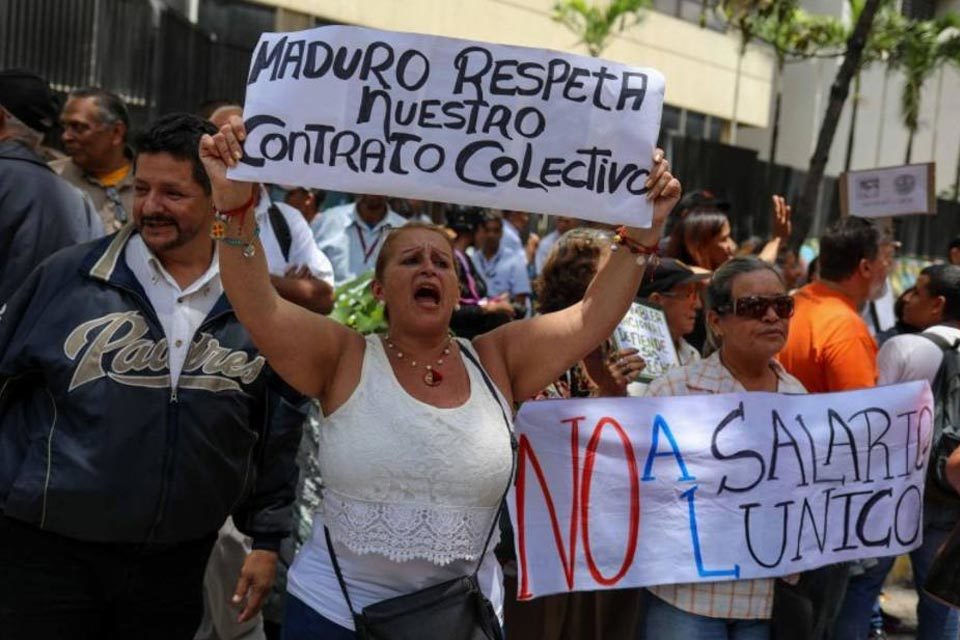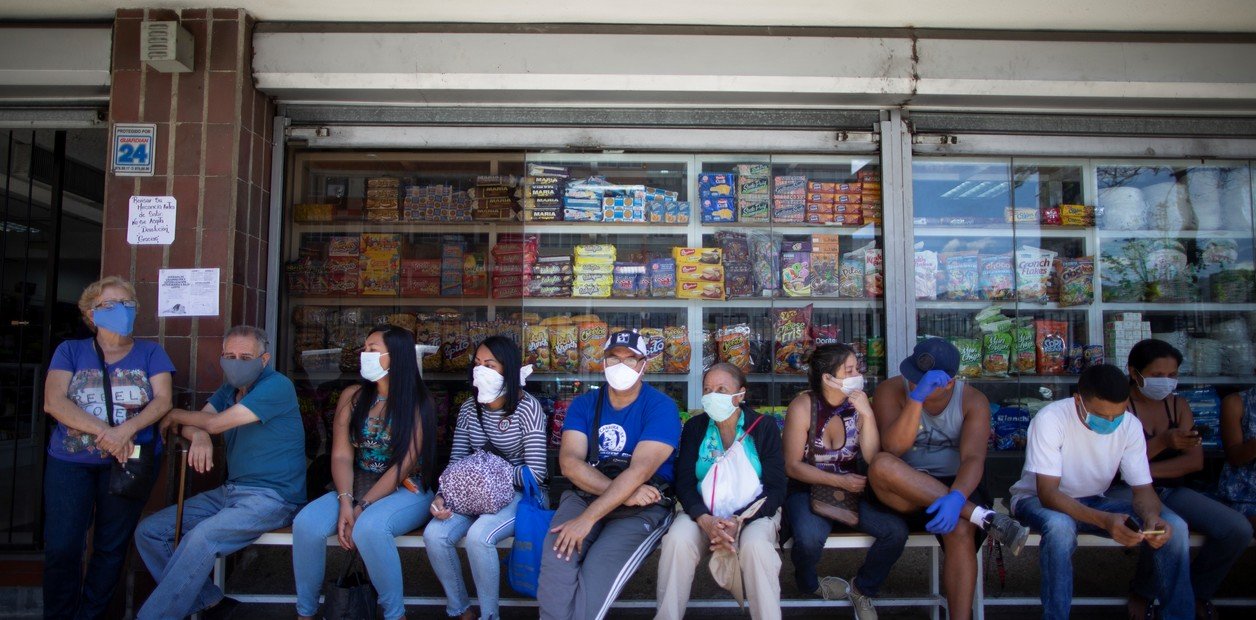The Commission for Human Rights of Zulia State (Codhez) published the January – March 2020 Bulletin on the general situation of human rights in Zulia.
The organization’s report documents two central situations affecting the well-being of the community. In the first chapter, it reviews the precarious provision of public services to homes and its effect on the quality of life of citizens in Zulia. In the second chapter, it refers to the spread of the COVID-19 disease, declared a pandemic on March 12 by the World Health Organization (WHO). The Venezuelan State has decreed a state of alarm due to the outbreak, which implies the limitation of more rights and risks of abuse of power.
No access to water
The same deficiencies regarding drinking water service reported last year have extended to the first quarter of 2020. Government entities do not provide effective or precise responses to this problem that worsens in the context of the quarantine.
According to a February announcement from the state-owned company Hidrolago, it was planned to quickly deal with water leaks in the main pipes, and “bring the current pumping scheme to once a week in Maracaibo neighborhoods” but the reality is that many of the communities do not have continuous service of drinking water, having to wait several weeks before receiving the service.
Residential neighborhoods like Cuatricentenario and La Victoria, west of Maracaibo, spend three to five months without running water while others like San Jacinto (north of the city) get service for only thirty minutes after a one month wait.
In the context of the COVID-19 quarantine, from March 13th to the 24th, at least 87 neighborhoods of Zulia across 8 municipalities and 31 parishes with a combined population of more than 2 million people, report experiencing difficulties to access drinking water. 53 of these are concentrated in Maracaibo. Other municipalities reporting malfunction include Jesús Enrique Lossada, San Francisco, Miranda, Santa Rita, Cabimas, Simón Bolívar, and Lagunillas.
In this sense, Codhez recalls that a contingency plan to guarantee the distribution of drinking water in Zulia during the health emergency is yet to be released. At the same time, it notes the upsurge in power outages and general blackouts in the region. The electrical emergency persists without a definitive solution in sight, leading to a repeated violation of the right to an adequate standard of living.
A state of alarm decree with unlimited powers
On March 13, the national executive power decided to issue a decree of a state of emergency to address the health emergency caused by the coronavirus (COVID-19). In this context, Codhez observes that governors and mayors issued restrictive measures ex novo through decrees, despite not having constitutional powers to do so.
On March 16, the Zulia Government published the Decree 822 in the extraordinary edition number 2,809 of the Official Gazette of the Zulia State, declaring a state of alert throughout the territory of the Zulia State, in response to public and notorious declaration of national emergency by the Government of the Bolivarian Republic of Venezuela in the context of the pandemic due to the COVID-19 disease. That same day, the Mayor’s Office of Maracaibo issued Decree 0023-2020, which was later repealed by current Decree 0024-2020 of March 19 establishing the collective and social quarantine within the Maracaibo municipality. These documents impose restrictions not contemplated in the national decree, even providing for sanctions.
Thus, Codhez declares that the constitutional way would have been to follow the regulatory framework and specific measures dictated by the national executive power so that governors and mayors could not innovate in the restrictions but enforce them under the provisions of the national regulation. For example, according to the non-governmental organization, the national government should have established a regulatory framework for transit restrictions, so that regional and local governments, according to their conditions, could specify schedules and other measures, provided they were contemplated as possible regulations in the national decree.
The ban on fuel sales and its effects on the right to health
Regarding the absolute prohibition of having fuel supplied to the general population, without minimal warranties to healthcare personnel and people in need of medical attention, Codhez describes the measure as “disproportionate” and only contributing to corruption and greater chaos. The prohibition on fuel sales to the public was announced on March 15, effective the next day, to allow for “prioritized sectors amid the contingency such as health, food, security, and telecommunications services to be supplied. Safe-conducts will be granted to sectors of social interest.”
Even though the health care sector should be considered essential, the non-governmental organization notices that on March 25, a group of people, including medical personnel and people in need of urgent medical treatment, waited more than twelve hours to refuel at the El Pinar service station. The following day, this group of people was evicted by the Bolivarian National Guard and police forces.
To protect the right to health, recognized as part of the right to life and provided for in the Constitution and international treaties signed and ratified by Venezuela, Codhez considers that the State must assume it as a fundamental obligation, especially in the current circumstances that compel it to prioritize the situation of people requiring urgent medical treatment.
Codhez demands that the State activates all its capacity to respond in an adequate and timely manner and fulfill its obligation to guarantee health and well-being to Zulia. The country, undergoing serious public health and sanitary crisis, now requires efficient measures for the prevention of the COVID-19 disease as well as for the treatment and recovery of the affected and those living with chronic health conditions, who cannot wait for the situation to improve before continuing their treatment.
San Carlos Prison breakout waiting for an explanation
Another of the situations documented in the Codhez report occurred at the beginning of the collective quarantine. Several prisoners fled the San Carlos del Zulia Arrest and Preventive Detention Center, also known as Retén de San Carlos, located in the Colón municipality (South of Maracaibo Lake).
The official version of the event taking place on March 18 indicates that a total of 84 prisoners, 76 men and 8 women, escaped from block A of the prison facility.
At the press conference on March 18, it was revealed that 35 of these people were ‘neutralized’ (a term used by the security forces to refer to people killed during police or military operations), and 5 recaptured. In statements that same day, both the state governor and the mayor of the Colón municipality, Blagdimir Labrador, clarified that 10 inmates were ‘neutralized’ in an alleged clash with the police. However, the governor stated that four people were recaptured, while the mayor indicated that it had been 6. The last official update regarding this event was on March 24 by the head of REDI-Zulia, who reported that, by that date, 17 fugitives had been ‘neutralized’, and 27 recaptured. Codhez observes that there was no precise official information after the first clarification of figures, nor any investigation to determine the facts or the circumstances of the confrontations.
You can read the full January – March 2020 Bulletin in Spanish HERE.




